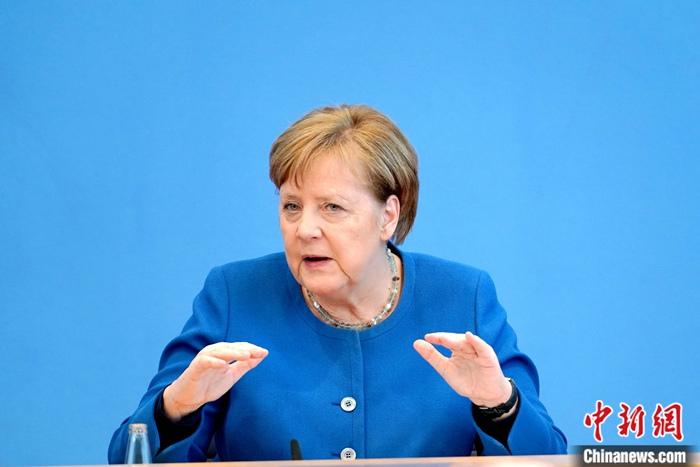German Chancellor Angela Merkel went to Moscow on the 20th to meet with Russian President Vladimir Putin.
Merkel said that this was a "farewell visit" before she stepped down as prime minister.
Putin said that it is not just a "goodbye", the two sides have a lot of "business" to discuss.
Data map: German Chancellor Merkel.
Photo by China News Agency reporter Peng Dawei
One of the topics is the Russian-German "Beixi-2" cross-border natural gas pipeline project.
Putin said that the pipeline laying project is only the last 15 kilometers away.
After receiving the "acquisition" of the United States in July, Merkel came to "commit" with Putin to "guarantee" Ukraine's status as a "transit country for gas transmission" and the security of energy supply. This is her promise to the United States, but it requires Russia to cooperate. .
She is going to Ukraine next stop, probably to "appease".
Another issue is the crisis in Afghanistan.
Merkel hopes that Russia can help Germany "withdraw people" from Afghanistan.
Germany has received some Afghan refugees who fled the war, and Merkel has received a lot of criticism for this in the country.
Now that the United States hastily withdrew its troops, Germany is also on the list of "temporary transit countries" announced by the United States for the shelter of Afghan refugees.
At the public meeting in the Kremlin that day, Merkel wore her favorite color "cornflower blue", the blue cornflower is the national flower of Germany; Putin presented Merkel with a bunch of pink and white flowers.
This scene is reminiscent of Merkel's visit to Russia in May 2018.
It was an official visit. Putin greeted Merkel with a bouquet of pink flowers in Sochi, but was interpreted as an "insult" by a German media, who thought it was an intention to emphasize Merkel's female identity.
At that time, because the US government strongly demanded that Germany abandon the "Beixi-2" project and Crimea and other issues, the two also had many unpleasant "businesses" to discuss.
Merkel and Putin can use each other's mother tongue fluently and can communicate without translation, but the two countries have very different positions on many issues and often disagree.
The meeting between the two in Moscow lasted nearly three hours. Merkel told reporters after the meeting that she once again asked Putin to release Russian opposition activist Alexei Navalny.
Putin categorically refused, saying that Navalny was detained because of illegality and not because of his political activities.
Navalny was unwell when he flew on a plane last year. Some Western countries claimed that he was "poisoned" by Russia, but Russia denied it.
After returning home earlier this year, Navariny was sentenced to imprisonment on charges of fraud.
Regarding the issue of Afghanistan, Putin stated that Russia does not intend to help the United States clean up the "mess" and hopes to establish good-neighborly and friendly relations with Afghanistan, while at the same time lashing at the United States and other Western countries to "impose values and democratic models on other countries."
As for the Ukraine issue, Putin questioned that Ukraine has no intention of peacefully resolving the conflict in eastern Ukraine.
However, Russia intends to fully implement the "gas transfer" agreement signed with Ukraine, and is willing to extend the agreement after it expires in 2024, but said it needs to consider more details.
Although differences often persist, according to the generalization of the British "Guardian", since Merkel became German Chancellor, German-Russian relations have "although they are very tense, but have never broken."
After Germany holds the federal parliament elections in late September this year, Merkel will end her fourth term as prime minister. She has been in power for 16 years and is one of the leaders of European powers with the longest time in power.
Although she has announced that she will no longer seek re-election, her political legacy may affect Germany's foreign policy line for a long time.
She withstood frequent pressure from the United States and maintained a relatively pragmatic stance on the development of German-Russian relations. A typical example is to insist on advancing "Beixi-2".
This project is good for German-Russian energy trade cooperation, but the United States regards it as Russia’s “geopolitical weapon”. Although the US government promised Germany in July that it would no longer sanction German companies because of the “Beixi-2”, it emphasized the need to adopt various measures. A way to "reduce risk."
On the day of Merkel's visit to Russia, two companies and a ship were added to the list of Russian entities sanctioned by the US government for participating in the "Beixi-2" project.
On the same day, the United States and the United Kingdom respectively imposed sanctions on several "Russian intelligence agents" involved in the "poisoning" incident in Navariny.
The "Beixi-2" pipeline still has 15 kilometers to be paved. It is expected to be completed in early September, but the premise is that the United States will no longer set up obstacles; and after the September election, Merkel will no longer be in power. Can the new prime minister continue his pragmatic style? Withstand the pressure of the United States, strike a balance between the "values" and "interests" of Germany and Europe, maintain contact and dialogue with Russia, and deepen cooperation rather than confrontation. There are still many suspense.
This 15 kilometers, at least will not be paved with flowers.
(Shen Min) (Xinhua News Agency Special Feature)

